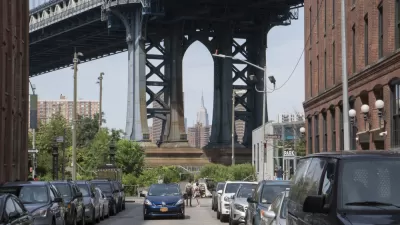Instead of imposing regulations on transportation network companies, Long Beach went a different way: the city eased regulations on taxi companies.
"Long Beach officials are pursuing a new strategy to resolve the growing rift between taxi drivers and ride-hailing services such as Uber and Lyft, becoming the nation's first large city to relax restrictions on cabs, rather than increase regulation of their new competitors," reports Laura J. Nelson.
According to Nelson, the changes allowed by the city include overhauls of the look and feel of taxi service: "In addition to a new name (Yellow Long Beach) and a new Uber-like app (Ride Yellow), Long Beach Yellow Cab will repaint its traditional mustard-colored taxis a more vivid lemon."
Nelson notes that Long Beach is ideally suited to innovate the regulation of taxi service, given the city's large size (but relatively small taxi fleet compared to Los Angeles, just up the road) and bustling convention and tourism industry.
The more relaxed regulations follow a year of decline in business for taxis in Long Beach, faced with competition from transportation network companies like Uber and Lyft. Nelson's article includes a lot more details about what makes the city's new regulations groundbreaking, especially as compared to other cities around the region, state, and country.
FULL STORY: Long Beach allows taxis to lower fares as they compete with Uber, Lyft

Alabama: Trump Terminates Settlements for Black Communities Harmed By Raw Sewage
Trump deemed the landmark civil rights agreement “illegal DEI and environmental justice policy.”

Planetizen Federal Action Tracker
A weekly monitor of how Trump’s orders and actions are impacting planners and planning in America.

The 120 Year Old Tiny Home Villages That Sheltered San Francisco’s Earthquake Refugees
More than a century ago, San Francisco mobilized to house thousands of residents displaced by the 1906 earthquake. Could their strategy offer a model for the present?

In Both Crashes and Crime, Public Transportation is Far Safer than Driving
Contrary to popular assumptions, public transportation has far lower crash and crime rates than automobile travel. For safer communities, improve and encourage transit travel.

Report: Zoning Reforms Should Complement Nashville’s Ambitious Transit Plan
Without reform, restrictive zoning codes will limit the impact of the city’s planned transit expansion and could exclude some of the residents who depend on transit the most.

Judge Orders Release of Frozen IRA, IIJA Funding
The decision is a victory for environmental groups who charged that freezing funds for critical infrastructure and disaster response programs caused “real and irreparable harm” to communities.
Urban Design for Planners 1: Software Tools
This six-course series explores essential urban design concepts using open source software and equips planners with the tools they need to participate fully in the urban design process.
Planning for Universal Design
Learn the tools for implementing Universal Design in planning regulations.
Clanton & Associates, Inc.
Jessamine County Fiscal Court
Institute for Housing and Urban Development Studies (IHS)
City of Grandview
Harvard GSD Executive Education
Toledo-Lucas County Plan Commissions
Salt Lake City
NYU Wagner Graduate School of Public Service





























